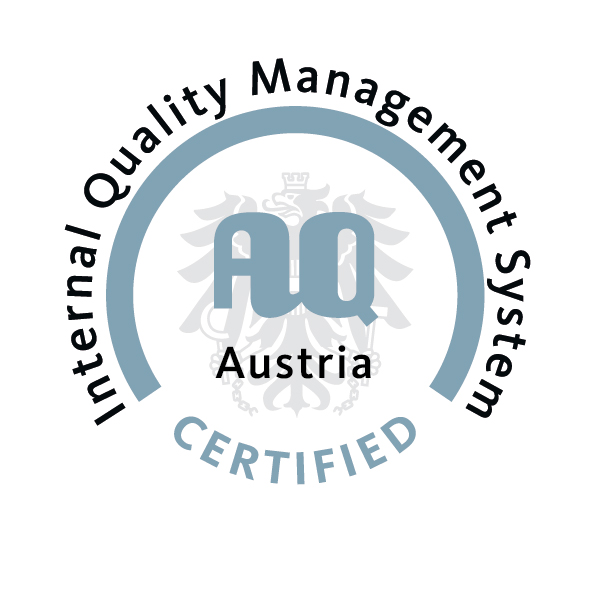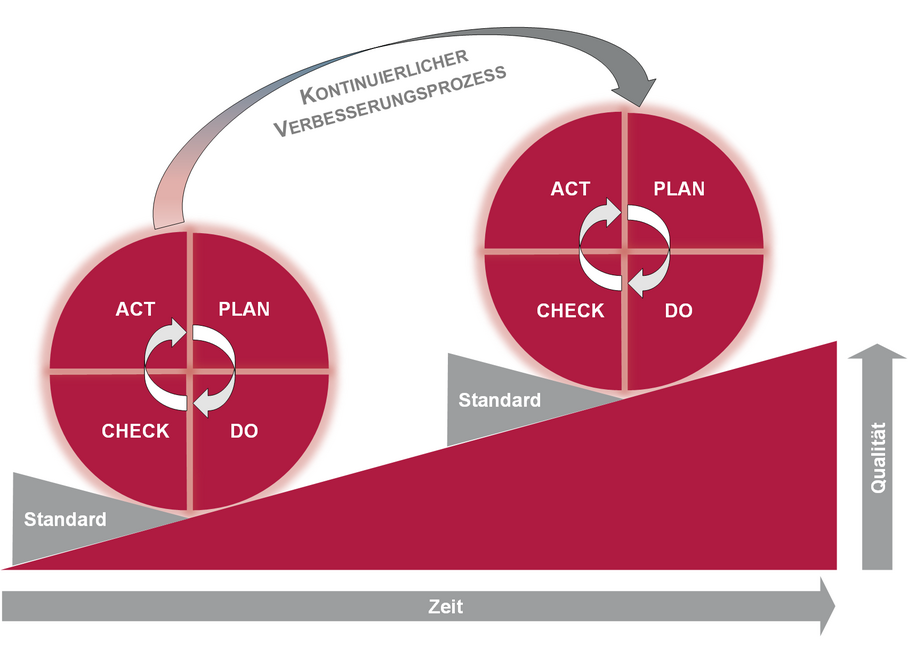
Quality Management, Evaluation & Reporting
Rechbauerstraße 12
8010 Graz
Manuela BERNER
Mag.rer.nat.
Head of the Staff Unit
Phone: +43 316 873 6004
manuela.berner@tugraz.at
TU Graz Quality Management System (QMS)
The TU Graz QMS is designed to fulfill the university’s mission statement and is based on a “Total Quality Management (TQM) approach”. It involves all groups working at the university (members of the university and external stakeholders) and comprises strategic control and university development, the core areas of teaching and research, the cross-functional tasks of internationalisation and social objectives, and supporting administrative tasks.
TU Graz sees quality management (QM) primarily as systematic quality assurance (QA) and continuous quality development (QD) within a process-based strategy geared to a “continuous improvement process” (CIP). The core element is the “Deming cycle” (PDCA cycle), according to which processes, performance and projects:
- are planned (P for “PLAN”) on the basis of a current analysis and identification of fields of action with defined objectives and measures for achieving them,
- plans are carried out (D for “DO”),
- the effectiveness of measures and the achievement of objectives are verified with quantitative and/or qualitative information, deriving recommended action (C for “CHECK”),
- improvement is implemented as a new standard and the insights gained by means of reflection in turn form the basis for the next stage of planning (A for “ACT”).
PDCA cycle (Deming cycle) and CIP (based on Helmold, M. (2023). Qualitätsmanagement. In: Wettbewerbsvorteile entlang der Supply Chain sichern. Wiesbaden: Springer Gabler. https://doi.org/10.1007/978-3-658-40609-7_6)
At a central level, TU Graz deploys various instruments and methods to assist university and faculty management in quality development and control processes and to strengthen quality awareness within the university. This includes instruments for controlling:
- Objectives, particularly the cascade of target agreements – deriving from the performance agreement with the Federal Ministry – between Rector and Dean, Dean and head of institute, head of institute and individual members of staff
- Rules, particularly process map, process descriptions, statue sections, internal guidelines, regulations and rules of procedure
- Evidence, particularly strategic analyses, reports and monitoring, e.g. intellectual capital report, ATRACK
- internal and external quality audits
- internal and external evaluations
Evaluations and audits

External and internal quality audits
The Act on Quality Assurance in Higher Education (HS-QSG) stipulates periodical certification of university QMS on the basis of an external quality audit every seven years. Even before the HS-QSG came into force, TU Graz was the first Austrian university to subject itself to this process in 2011. Following recertification in 2018, the internal QMS of TU Graz was certified by AQ Austria for a further seven years in September 2025, confirming that it fully complies with international standards. The team of experts assessed the QMS of TU Graz as sustainable, effective, and future-oriented, and was particularly impressed by the reflective, consensus-oriented university culture and the high level of quality awareness among all those involved. The certification decision is unconditionally valid until September 16, 2032.
- AQ Austria`s result report, including expert opinion and statement from TU Graz (in German)
- Certification decision by AQ Austria (in German)
- Certificate
In preparation for the external quality audits, internal quality audits to identify any potential for improvement, to encourage further development of the QMS and to strengthen quality culture at the university. They take place every two years following the external audit (internal interim audit) and in the year preceding the external audit (preparatory audit).
Besides audits, TU Graz uses external evaluations as a key component of QA and QD, not only at university level but also as part of its faculty evaluations performed as peer review processes with the collaboration of international experts. The aim of these evaluations is to obtain an external assessment of the current situation and the intended path of development in order to perform a sound evaluation of the intended alignment and further development of the faculties and thus enable evidence-based control. Since 2015, all faculties have completed an initial round addressing the core topics of research, study and teaching, along with structure and organisation, both in many detailed aspects and from a general perspective. The results and recommendations of these evaluations were discussed in internal faculty workshops and translated into measures agreed with the university management.
Examples of regular internal evaluations are:
- evaluation of individuals (e.g. as part of the qualification agreement)
- evaluation of courses, examination grades and graduations
- surveys of students, staff and external stakeholders (e.g. graduates) at various stages of the student life cycle
TU Graz staff can find further information on the intranet TU4U.


